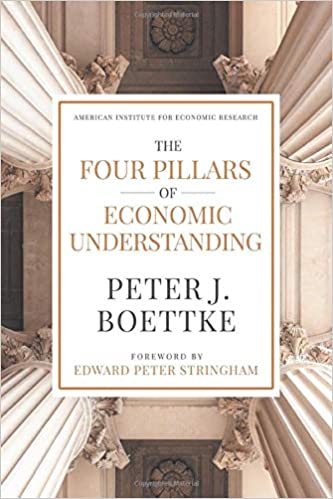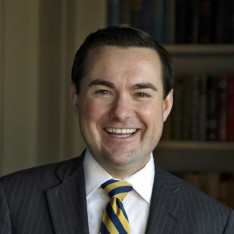Boettke Makes Economics Life-Affirming and Intellectually Adventurous

For centuries, economists have struggled for ways to impart economic lessons to the general public, with the hope of impressing upon people who are not studying formally the need to grasp the logic and meaning of economics.
This is a cause that Peter Boettke, my professor and dissertation advisor, took up from the day he encountered the elegance and rigor of economic science. In his long and productive career, as a teacher and mentor to many thousands, he has never relented from this goal.
From first-hand experience, I can testify to his remarkable passion for the topic and burning desire not only to know more but to pass on that knowledge and passion to his students. I was his student and know what it is like to be a recipient of his intellectual benefaction.
Four Pillars of Economic Understanding puts every reader in the position of being his student. You will experience the warmth, excitement, and energy of his teaching style, as well as the creativity of his exposition. It comes through on every page. I’m particularly excited about this book because it takes huge strides in refuting the myth that economics is somehow cold and cruel. Professor Boettke happily writes of economic forces as beautiful, life-affirming, and intellectually adventurous.
His wonderful book is available now in softcover, and soon to arrive in Kindle. It is published by the American Institute for Economic Research (2020).
Economists have worked for centuries for ways to present their core lessons to the general public in ways that are accurate and reflective of its true implications for our lives. We did a better job in the 18th century than we have in the last hundred, with the exceptions of the bright light of the Austrian School. Great economists, not always in the mainstream, have always known that economics is about the flourishing of human beings and the need for open societies that allow for experimentation, innovation, and the emergence of the order that only liberty can beget.
In this effort, Professor Boettke has made a genuine contribution, building on the works of the great minds of the past to provide a new and unique presentation for the current age. This is why the American Institute for Economic Research is so honored to publish this book: it holds the potential to be recognized as a seminal and classic statement concerning the implications of economics for our lives.
If we take his book seriously, we will change the way we think and speak about the discipline itself. It’s a serious challenge, one that pertains not only to professional economists but to everyone who is concerned about the future of peace and prosperity.











